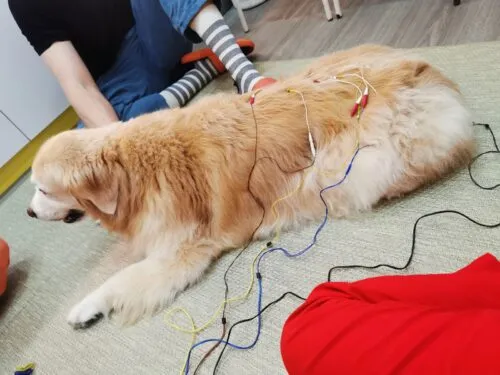Acupuncture, a key component of Traditional Chinese Medicine (TCM), has been practised for thousands of years to maintain health and treat a wide variety of conditions in humans. In recent decades, acupuncture has gained traction in the field of veterinary medicine as a complementary therapy for pets, offering a natural and non-invasive approach to support their well-being. This blog post will provide an introduction to acupuncture for pets, discussing its history, application, and potential benefits.
The History of Acupuncture
Acupuncture has its roots in ancient China, with the earliest recorded usage dating back over 2,000 years. The fundamental principle of acupuncture is to balance the body’s flow of energy, known as “Qi” (pronounced “chee”), through the stimulation of specific points on the body. In TCM, it is believed that disruptions in the flow of Qi can lead to illness and discomfort, and that acupuncture can help to restore balance and promote healing.
How Acupuncture Works
Acupuncture involves the insertion of fine, sterile needles into specific points on the body, known as acupuncture points. These points are found along pathways called meridians, which are believed to be channels of energy flow within the body. The precise stimulation of these points is thought to regulate the flow of Qi, improve circulation, and support the body’s natural healing processes.
In the context of veterinary medicine, acupuncture is believed to work through a combination of physiological mechanisms, including:
- Stimulating the release of natural pain-relieving substances, such as endorphins and serotonin
- Reducing inflammation and promoting tissue healing
- Modulating the nervous system to alter pain perception
- Regulating the immune system to support overall health
Potential Benefits of Acupuncture for Pets
Acupuncture has been shown to benefit pets with a variety of conditions, including:
- Pain Management: Acupuncture can help to alleviate pain in pets suffering from chronic conditions such as arthritis, hip dysplasia, and intervertebral disc disease. It can also provide pain relief for pets recovering from surgery or injury.
- Gastrointestinal Disorders: Acupuncture may be beneficial in treating pets with gastrointestinal issues such as inflammatory bowel disease, constipation, and diarrhoea.
- Neurological Conditions: Pets with neurological disorders, such as seizures, peripheral nerve paralysis, and degenerative myelopathy, may benefit from acupuncture therapy.
- Respiratory Problems: Acupuncture can help to alleviate respiratory issues such as asthma and chronic bronchitis in pets.
- Allergies and Skin Conditions: Pets suffering from allergies or skin conditions, such as atopic dermatitis, may experience relief from acupuncture treatments.
- Behavioural Issues: Acupuncture can help to reduce anxiety and stress levels in pets, potentially improving behavioural issues such as separation anxiety and aggression.
What to Expect During an Acupuncture Session
During an acupuncture session, your pet will be placed in a comfortable position, and the practitioner will gently insert fine needles into specific acupuncture points. The needles are typically left in place for 10-30 minutes, depending on the condition being treated. Most pets tolerate acupuncture well and may even find the experience relaxing.
The number of sessions required will vary depending on your pet’s individual needs and the severity of their condition. Acute issues may resolve with just a few sessions, while chronic conditions may require ongoing treatment.
Choosing a Qualified Veterinary Acupuncturist
It is essential to work with a qualified veterinary acupuncturist to ensure the safety and effectiveness of acupuncture for your pet. This can be a veterinarian with additional training and certification in veterinary acupuncture or a certified animal acupuncturist. Always consult with your veterinarian before seeking acupuncture treatment for your pet.
Frequently Asked Questions
1. What is acupuncture for pets?
Acupuncture for pets is a complementary therapy used in veterinary medicine to support pets’ well-being. It involves the insertion of fine, sterile needles into specific points on the body to regulate energy flow, improve circulation, and support the body’s natural healing processes.
2. What conditions can acupuncture help treat in pets?
Acupuncture can help treat various conditions in pets, including pain management, gastrointestinal disorders, neurological conditions, respiratory problems, allergies and skin conditions, and behavioral issues.
3. Is acupuncture safe for pets?
When performed by a qualified veterinary acupuncturist, acupuncture is considered safe for pets. It is essential to consult with your veterinarian before seeking acupuncture treatment for your pet.
4. How does acupuncture work for pets?
Acupuncture works by stimulating specific points on the body, known as acupuncture points, to regulate the flow of energy, improve circulation, and support the body’s natural healing processes. It is believed to work through a combination of physiological mechanisms, including pain relief, inflammation reduction, nervous system modulation, and immune system regulation.
5. How many acupuncture sessions will my pet need?
The number of acupuncture sessions required depends on your pet’s individual needs and the severity of their condition. Acute issues may resolve with just a few sessions, while chronic conditions may require ongoing treatment.
6. How do I find a qualified veterinary acupuncturist?
To find a qualified veterinary acupuncturist, consult your veterinarian for recommendations or search for certified practitioners through professional organizations such as the International Veterinary Chiropractic Association (IVCA) or the British Veterinary Chiropractic Association (BVCA).
7. Will my pet feel pain during acupuncture treatment?
Most pets tolerate acupuncture well and may even find the experience relaxing. The needles used are very fine, and the insertion is typically gentle, causing minimal discomfort.
8. Can acupuncture replace conventional veterinary care?
Acupuncture should be used as a complementary therapy alongside conventional veterinary care, working together to address a wide range of issues and maintain your pet’s overall health and well-being. It is essential to maintain open communication with your pet’s primary veterinarian throughout acupuncture treatments.
